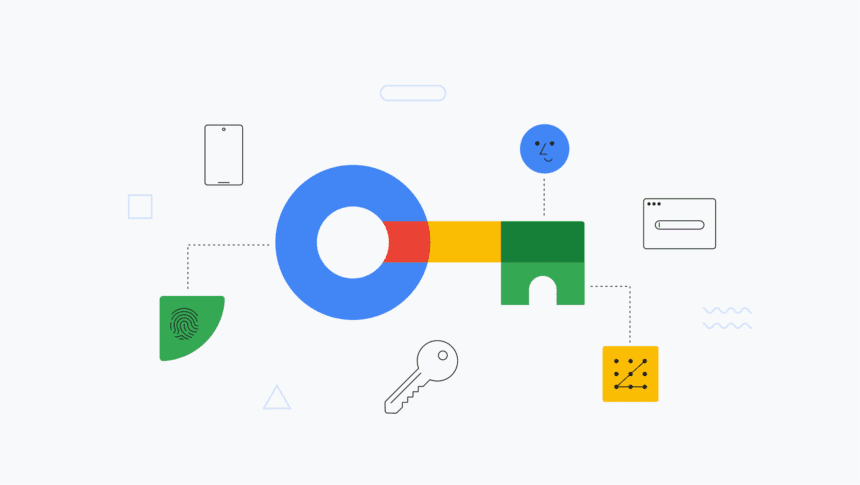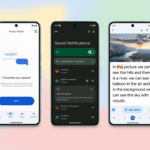For these of us who’ve spent 1 / 4 century memorizing passwords — transforming pet names, birthdays and sports activities groups into our sign-in credentials — it’s straightforward to yearn for less complicated instances. Plus, filling our heads with random numbers and particular characters is an imperfect protection. A decade of information breaches, hacks and phishing makes an attempt have remodeled passwords from an individual’s first line of protection to their main safety vulnerability.
To assist, together with Apple and Microsoft, we announced last year that we might help a brand new sign-in customary created by the FIDO (Quick IDentity On-line) Alliance that might permit folks all over the world to enter a “passwordless future.” This joint effort to create a safer various to passwords is rooted in passkeys — and beginning right this moment, you possibly can join passkeys utilizing the “skip password when attainable” immediate in your Google account.
Passkeys are a brand new characteristic on computer systems and smartphones that securely log you into your accounts throughout the online by utilizing biometrics like a fingerprint or face scan, or a display lock PIN. No extra remembering passwords for each considered one of your accounts on apps and web sites — passkeys handle securely finishing authentication with a service in your behalf.
Whereas we welcome a safer future, as with every new expertise we had a couple of questions. To get solutions, we sat down with Google Safety professional Christiaan Model. Learn on for an informative Q&A with Christiaan, which has been edited for size and readability.
In easy phrases, what’s a passkey?
A passkey is a FIDO credential saved in your laptop or telephone, and it’s used to unlock your on-line accounts. The passkey makes signing in safer. It really works utilizing public key cryptography and proof that you just personal the credential is simply proven to your on-line account while you unlock your telephone.
To signal into an internet site or app in your telephone, you simply unlock your telephone — your account received’t want a password anymore.
Or should you’re attempting to signal into an internet site in your laptop, you simply want your telephone close by and also you’ll be prompted to unlock your telephone — which can then grant you entry in your laptop.
You discuss a “passwordless future” — will passkeys actually exchange passwords?
Sure, passkeys will exchange passwords. It’s even broader than that. I’d say our imaginative and prescient for passkeys is to not solely do away with passwords, but in addition remove all of the Band-Aids the business has designed to make up for the truth that passwords are so weak.
And by “Band-Aids” you imply problem questions like “What was your highschool mascot?” or “What’s your mom’s maiden title?”
Sure, however much more subtle fixes like multi-factor authentication, SMS messages, or authenticator apps. For instance, we constructed the Google Authenticator App to offer folks an additional layer of safety on the internet. Passkeys will exchange all of this.
We hardly ever hear the phrase “public” and “cryptography” in a single phrase — how does it truly work?
Public key cryptography has been round because the Nineteen Seventies — the online is constructed on it. Within the Nineteen Nineties, Netscape developed encryption based mostly on public keys known as Safe Sockets Layer — or SSL — as a method of authenticating web sites and making certain consumer privateness. Safe web sites all have them and it’s how one can determine whether or not an internet site is genuine and what it claims to be.
So it authenticates web sites — however how does that authenticate folks?
Passkeys are much like SSL, extra lately known as TLS. However as a substitute of techniques authenticating one another, an individual has the corresponding personal key on their machine. The cryptography portion of that is that the web site can affirm that the consumer’s machine — which biometrics affirm is of their possession — has the passkey. Due to the cryptography the server by no means truly learns what the consumer’s passkey truly is. That’s the magic of public key cryptography. It will probably validate you with out figuring out something about you. It simply confirms you might be who you say you might be.
So if this cryptography has been round because the Nineteen Seventies, why have we been memorizing passwords because the Nineteen Nineties?
Public key cryptography wants computing energy. Up till about 2010, most individuals weren’t strolling round with computer systems of their pockets.
That’s what smartphones are. Pocket computer systems. And whereas smartphones have been perceived as vulnerabilities, passkeys can remodel them into the most important shift for on-line safety in a long time.
OK, however should you lose your telephone, can the one who finds it use your passkey?
No, as a result of the telephone is simply a part of it. Previously, logging onto a safe web site required two issues: You simply needed to have a machine to entry the web; and also you wanted to recollect one thing, like your password. That signifies that if somebody bought your password all they wanted was entry to the web — from wherever.
Passkeys are an evolution. They authenticate that you are in possession of your machine, and that you’re the one accessing your account. It’s zero-trust in that it requires that one thing about you should be true. That’s safer and easier for folks.
Your fingerprint, your face: the power to unlock your machine — this stuff and your machine should be in your possession. If somebody will get your machine, they’ll’t do something along with your passkey. And should you lose your previous machine containing your passkey, you possibly can simply create a brand new passkey in your new machine.
And you may have a couple of passkey on a number of gadgets?
Sure, you possibly can have many passkeys and even have passkeys on gadgets shared with your loved ones. That’s one of many large leaps. The cryptography means passkeys — nevertheless many you may have, and wherever they’re saved — are solely helpful to the consumer.
This looks as if one of many first safety advances that require folks to do much less.
That’s true — and that’s a part of the zero-trust innovation. Since all of us have lots on our minds, we are able to deal with different issues whereas concurrently being safer.
On innovation. They are saying — I believe — that nice improvements remedy acquainted issues. At their greatest, innovation means the issues that fear us will make our kids yawn. What on a regular basis safety issues do passkeys remedy that may make my kids yawn?
Three issues that fall into that class:
First, passwords getting stolen. We hear each week about some firm getting hacked and passwords are stolen. Since folks typically recycle passwords throughout the online, that can provide dangerous actors entry to numerous completely different accounts — electronic mail, banking, social media. Passkeys cease that.
Second, authentication is imperfect and time consuming. Authentication signifies that even when somebody will get ahold of your password, they might nonetheless want one other piece of information. It’s why we constructed the Google Authenticator App. The app helped mitigate knowledge breaches. However that nonetheless means an individual has work to do — and it places the burden on the person consumer. It’s time consuming. The consumer shouldn’t be so alone in safety and authentication — and for a few a long time they largely have been.
Third, youngsters will look again on “phishing makes an attempt” as beginner theatrics. Phishing is when somebody sends you an electronic mail, it appears to be like official, and also you click on on the hyperlink and also you begin typing your credentials. Phishing makes an attempt have grown extra subtle and typically folks won’t solely be tricked into giving their username and password, however authentication data and different private particulars. Plus, phishing additionally places the burden on customers to find out how credible an electronic mail or web site appears to be like. That’s not very technical. Passkeys can remedy the phishing downside.
One query lots of people could have — and that issues biometrics like fingerprints and facial recognition. Do you suppose folks needs to be involved about biometrics working with their machine to empower passkeys?
None of our fashionable gadgets, laptops, smartphones or desktops — even people who use biometrics — can bundle biometric data and ship it to the cloud. Fashionable smartphones aren’t constructed to share biometrics. It’s at all times native and in your machine. Even when your machine will get stolen, the thief received’t have your biometrics to activate the passkey.
We all know that new expertise takes time to earn belief and obtain widespread adoption. We additionally reside in an age when a number of new digital novelties kind of masquerade as breathtaking innovation. How can folks ensure passkeys are value their time?
They will arrange passkeys subsequent time they’re prompted by a service. Spend a little time, after which save a lot of time and psychological vitality after that — and be much more safe.









